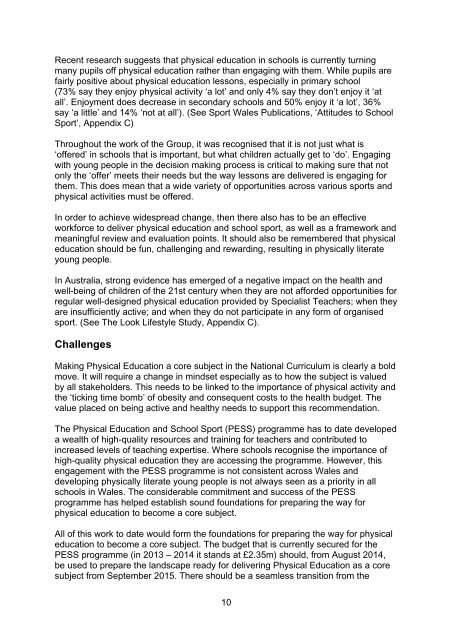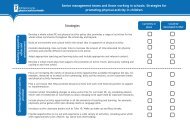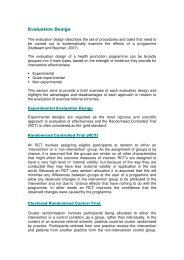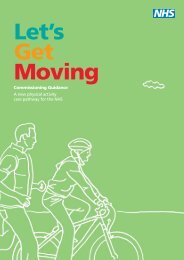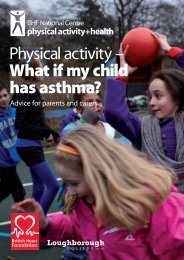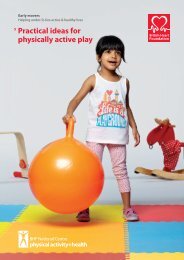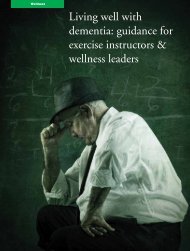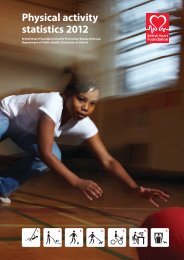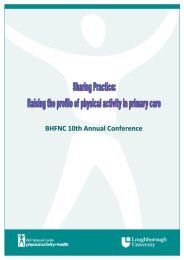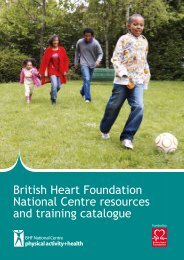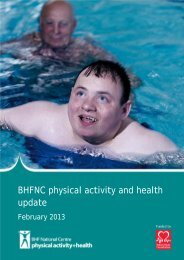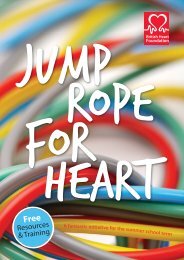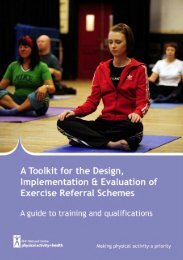Physical Literacy - Sport Wales
Physical Literacy - Sport Wales
Physical Literacy - Sport Wales
Create successful ePaper yourself
Turn your PDF publications into a flip-book with our unique Google optimized e-Paper software.
Recent research suggests that physical education in schools is currently turning<br />
many pupils off physical education rather than engaging with them. While pupils are<br />
fairly positive about physical education lessons, especially in primary school<br />
(73% say they enjoy physical activity ‘a lot’ and only 4% say they don’t enjoy it ‘at<br />
all’. Enjoyment does decrease in secondary schools and 50% enjoy it ‘a lot’, 36%<br />
say ‘a little’ and 14% ‘not at all’). (See <strong>Sport</strong> <strong>Wales</strong> Publications, ‘Attitudes to School<br />
<strong>Sport</strong>’, Appendix C)<br />
Throughout the work of the Group, it was recognised that it is not just what is<br />
‘offered’ in schools that is important, but what children actually get to ‘do’. Engaging<br />
with young people in the decision making process is critical to making sure that not<br />
only the ‘offer’ meets their needs but the way lessons are delivered is engaging for<br />
them. This does mean that a wide variety of opportunities across various sports and<br />
physical activities must be offered.<br />
In order to achieve widespread change, then there also has to be an effective<br />
workforce to deliver physical education and school sport, as well as a framework and<br />
meaningful review and evaluation points. It should also be remembered that physical<br />
education should be fun, challenging and rewarding, resulting in physically literate<br />
young people.<br />
In Australia, strong evidence has emerged of a negative impact on the health and<br />
well-being of children of the 21st century when they are not afforded opportunities for<br />
regular well-designed physical education provided by Specialist Teachers; when they<br />
are insufficiently active; and when they do not participate in any form of organised<br />
sport. (See The Look Lifestyle Study, Appendix C).<br />
Challenges<br />
Making <strong>Physical</strong> Education a core subject in the National Curriculum is clearly a bold<br />
move. It will require a change in mindset especially as to how the subject is valued<br />
by all stakeholders. This needs to be linked to the importance of physical activity and<br />
the ‘ticking time bomb’ of obesity and consequent costs to the health budget. The<br />
value placed on being active and healthy needs to support this recommendation.<br />
The <strong>Physical</strong> Education and School <strong>Sport</strong> (PESS) programme has to date developed<br />
a wealth of high-quality resources and training for teachers and contributed to<br />
increased levels of teaching expertise. Where schools recognise the importance of<br />
high-quality physical education they are accessing the programme. However, this<br />
engagement with the PESS programme is not consistent across <strong>Wales</strong> and<br />
developing physically literate young people is not always seen as a priority in all<br />
schools in <strong>Wales</strong>. The considerable commitment and success of the PESS<br />
programme has helped establish sound foundations for preparing the way for<br />
physical education to become a core subject.<br />
All of this work to date would form the foundations for preparing the way for physical<br />
education to become a core subject. The budget that is currently secured for the<br />
PESS programme (in 2013 – 2014 it stands at £2.35m) should, from August 2014,<br />
be used to prepare the landscape ready for delivering <strong>Physical</strong> Education as a core<br />
subject from September 2015. There should be a seamless transition from the<br />
10


